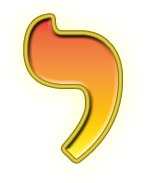
The number ten embodies creativity, strength, and resilience. From the Hebrew letter Yod to the month of Tevet, discover how this powerful symbol reflects both darkness and hope in Jewish tradition.
Significance of Yod
The word “Yod”, the tenth letter of the 22 letters in the Hebrew alphabet, has a numerical value of 10. It symbolizes a hand and is depicted as a clenched fist with the image of a lion, representing a fighting spirit that grapples with challenges. Despite being the smallest in appearance among the Hebrew letters, Yod holds a unique, powerful, and highly energetic quality according to Kabbalistic views.
Hebrew alphabet letters often comprise two or, at most, three Yods. In other words, Yod manifests in the construction of nearly every letter. For example, the letter ש (“Shin”) consists of three Yods, while צ (“Tsade”) is a combination of two Yods. Similarly, the letter ו (“Vav”) represents an elongated Yod.
Yod in God’s Name
Kabbalists believe that each Hebrew letter and number has unique powers, and their combinations in words can generate distinct energies. The correct pronunciation of these letters and words is thought to have a profound effect on both individuals and their surroundings. In this context, the fifth commandment in the first tablet of the Torah emphasizes refraining from uttering God’s name in vain. Accordingly, Kabbalistic teachings highlight the importance of precise pronunciation of Hebrew letters to harness their intended purpose. Special care must be taken in pronouncing the Tetragrammaton, the ineffable name of God, which contains the letters “Yod-He-Vav-He”. Jewish scholars have advised avoiding its pronunciation unless in exceptional circumstances, recognizing the heightened significance of the Yod within these combinations.
The study of letters and numbers is vast and cannot be fully explored here. This writing, however, aims to present a selection of significant ideas regarding the number ten.
Number 10
For centuries, cultures have drawn on the principles of Kabbalistic texts, particularly the Zohar, to shape theories in this field. The number ten, with its singular form as one, represents the foundation of life and the origin of all numbers. It symbolizes the Almighty, embodies positive energy, and is associated with the sun. Its key attributes—creativity, strength, and resilience—empower it to undertake significant responsibilities with diligence.
In Hindu scriptures, the number ten is symbolized by the wheel of fortune, representing brilliance, honor, and life’s inherent cycles of rise and fall. It also signifies luck and prosperity.
The number ten holds special meaning, shaped by individual desires and aspirations. For those with a goal or ambition, it often becomes a symbol of luck.

The Tenth Month of the Zodiac
Characteristics of those born in Tevet
In the Hebrew calendar, the tenth month corresponds to “Tevet”, associated with the Capricorn zodiac sign, governed by the planet Saturn. Its symbolic representation is the goat. Capricorns, whether male or female, are known for shouldering greater responsibility than those born under other signs. They are self-driven, resolute, and possess a fighting spirit marked by endurance and patience. With a strong inclination toward risk-taking, Capricorns also embody ten key positive traits: leadership, patience, determination, precision, optimism, ambition, diligence, self-reliance, trustworthiness, and piety, often coupled with a sense of introversion.
Negative traits of Capricorns include materialism, mental laziness or poor focus, excessive pride and arrogance, and unbridled ambition. Occasionally, they may lack genuine love in their hearts; however, when love does form in their lives, it is undoubtedly manageable.
Darkness and light in Tevet
Kabbalists view the tenth month, Tevet, as a time of profound darkness and obscurity. Yet, it is also a month filled with sparks of hope, symbolizing that every light emerging from darkness brings illumination. This is why God ordained the festival of Hanukkah, which represents the manifestation of Divine light, to occur before Tevet, in the month of Kislev.
Representation of prophets
The month of Tevet symbolically represents the tribe of Asher, the tenth son of Jacob. He is a symbol of blessing and abundance, particularly in his domain, and a source of prosperity among other tribes. The corresponding Sephirot or Divine energy is Netzach, associated with Moses and designated to the lower realm. It symbolizes eternity, with its Divine energy rooted in hope and victory.
Significant Events in the Tenth Month
The tenth month in the Jewish calendar is called Tevet and, like the Babylonian months, corresponds to the Capricorn zodiac sign. According to Jewish history, the month of Tevet has witnessed various significant events, including occasional catastrophic and tragic occurrences.
Nebuchadnezzar’s siege of Jerusalem
According to an ancient tradition, the tenth of Tevet is observed annually as the fast of Asarah B’Tevet. This fast commemorates the siege of Jerusalem by Nebuchadnezzar, king of Babylon, in 425 BC (3405 Hebrew Calendar). After three years of famine, the city’s resistance collapsed, leading to its fall. Solomon’s Temple (Beit HaMikdash) was seized by invading forces and immediately destroyed on Nebuchadnezzar’s orders.
Captivity of Jeconiah
During the same month, Jeconiah, the king of Judah, along with a large group of officials, elites, artists, and intellectuals, was taken into Babylonian captivity. This event is recorded as one of the most tragic occurrences in the Hebrew calendar.
Death of Ezra and Nehemiah
On the ninth of Tevet, two of the greatest Jewish political leaders, Ezra the Scribe and Nehemiah, passed away. Both were granted permission by Cyrus the Great of Persia to rebuild Jerusalem after the Jewish people’s liberation. Their deaths left an irreplaceable void.
First Torah translation
In 285 BC, during the month of Tevet, the Torah was translated into Greek for the first time. Many Jewish scholars of the time viewed this translation as a grave misstep, believing it not only stripped the Torah of its sanctity but also made its spiritual meaning inaccessible.
Expulsion of Portuguese Jews
Another painful event in Tevet was the massacre and forced conversion or exile of Portuguese Jews who refused to accept Jesus of Nazareth as the Son of God.
Source
Mythical Beliefs, Yosef Setareshenas


 فارسی
فارسی